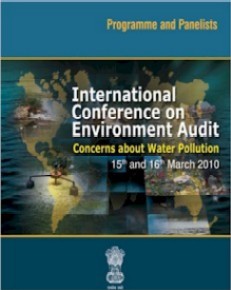/topics/ecology-and-environment
Ecology and Environment
Manual on operation and maintenance of water supply systems - CPHEEO (MoUD)
Posted on 15 Sep, 2010 10:58 PMThis manual has been developed by the Central Public Health and Environmental Engineering Organisation (CPHEEO), a department under the Ministry of Urban Development (MoUD) and is intended primarily for the managers and technicians in-charge of the O & M of the urban drinking water supply systems.
The aim of the manual is to serve as a guide for strengthening the technical, operational and managerial capabilities required of the concerned personnel to operate and maintain water supply services as per acceptable norms of quantity, quality, sustainability, reliability and cost.
ECO Sanitation - A beneficial toilet
Posted on 13 Sep, 2010 12:27 AMA brochure from Utthan about Eco-sanitation produced with support from Arghyam.
Type of rocks – A presentation by ACWADAM
Posted on 11 Sep, 2010 08:07 PMThis presentation by ACWADAM deals with the three basic types of rocks that are found in nature – igneous, sedimentary and metamorphic. Rocks are classified on the basis of minerals & chemical composition, by texture and by the processes that formed them.

Seeds of Hope – Forestry - A Lokayan and Planning Commission study
Posted on 10 Sep, 2010 11:50 PMThis set of case studies is a part of a book prepared by Lokayan in collaboration with the Planning Commission titled “Seeds of Hope", covering themes of agriculture, biodiversity, education, forestry, governance, health, movements and water. The case studies related to forestry are summarized below:
International conference on environment audit - Concerns about water pollution - CAG (2010)
Posted on 10 Sep, 2010 05:15 PM This link on the CAG website provides the details of an international conference that was held on 15-16 March 2010, in the backdrop of the environmental audit proposed by the the Comptroller and Auditor General (CAG) of India, for management and conservation of the environment .
This link on the CAG website provides the details of an international conference that was held on 15-16 March 2010, in the backdrop of the environmental audit proposed by the the Comptroller and Auditor General (CAG) of India, for management and conservation of the environment .
The purpose of this conference was to deliberate on the causes of pollution, action taken by governments and civil society to address this and environmental, management and legal interventions needed to put lakes, rivers and ground water on the path of sustainability.
More than 20 experts on water and water pollution issues were invited to share their views as panelists during the conference. Apart from these distinguished panelists, the heads of supreme audit institutions from countries like Austria, Maldives, Bangladesh and Bhutan were also present to share their experiences regarding audit of water pollution in their countries.
Seeds of Hope – Agriculture and Food Security - A Lokayan and Planning Commission study
Posted on 05 Sep, 2010 10:37 PMThis set of case studies is a part of a book prepared by Lokayan in collaboration with the Planning Commission titled “Seeds of Hope", covering themes of agriculture, biodiversity, education, forestry, governance, health, movements and water. The case studies related to agriculture and food security are summarised below:
Transparency demanded in a letter to Jairam Ramesh on Polavaram Project - Himanshu Thakkar
Posted on 04 Sep, 2010 10:43 AM![]()
From:
Himanshu Thakkar
South Asia Network on Dams, Rivers & People,
c/o 86-D, AD block, Shalimar Bagh,
Delhi,
To: Shri Jairam Ramesh
Union Minister of State for Env and Forests (IC), New Delhi
Respected Sir,
I have just seen your letter dated Aug 18, 2010 to Orissa Chief Minister on the aboves subject, uploaded yesterday on MEF website.
- Your letter says that the Forest Clearance has been given to the Polavaram Project on July 28, 2010 is subject to the condition, "... no submergence and displacement of people including STs take place in Orissa and Chhattisgarh...". However, this condition is in complete contradiction with the environment clearance given by your ministry on Oct 25, 2005, which says in para 2, "Total 1,93,35 persons are likely to be affected by this project, out of that 1,75,275 persons in Andhra Pradesh and 6,316 persons from Orissa and 11,766 are from Chattisgarh." It is clear the condition of no submergence and displacement on Orissa and Chhattisgarh, stated in your letter, in the Tribal Development Ministry's condition, and in the forest clearance letter is in complete contradiction with the environment clearance given by you. One of them have to be cancelled due to this contradiction, we would like to know, which one would be cancelled.
13th Biennial Conference of the International Association for the Study of the Commons (IASC), Hyderabad
Posted on 03 Sep, 2010 03:41 PM13th Biennial Conference of the International Association for the Study of the Commons (IASC)
Theme: "Sustaining Commons: Sustaining Our Future"


Organizers:
- International Association for the Study of the Commons (IASC)
- Foundation for Ecological Security (FES)
Venue: Hyderabad, India.
Description:
The 13th Biennial Conference of the International Association for the Study of the Commons (IASC) will be held in Hyderabad, India from January 10th to 14th, 2011. The Conference is being held in South Asia for the first time; and in a departure from the past, will be hosted by a practitioner organization - Foundation for Ecological Security (FES).
Movie reviews from 'Voices from the Waters 2010' film festival held in Bangalore
Posted on 28 Aug, 2010 08:58 AM
Reviews of some of the movies screened -
“Be water, My friend”
This UNESCO funded film, “Be water, My friend” tracks the research of Professor Gordon Lightgoot, an expert on ancient water monuments as he tries to understand and rectify the alarming drying up of Karez’s in northern Iragi region of Kurdistan.
Environmental flows in river basins: A case study of river Bhadra - Current Science
Posted on 26 Aug, 2010 12:50 PMThe quantity and seasonality of water flow in a river may greatly change from its normal condition between a major storage and downstream, thus paving the way for drastic changes in the riverine ecosystem. ‘Environmental flow’ refers to the amount of water considered sufficient for protecting the structure and function of an ecosystem and its dependent species.
The paper goes on to describe the case of river Bhadra, which is the site of a dam that has significantly altered the natural flow of the river and describes the study that aimed at conducting the environment flow analysis of the river.





